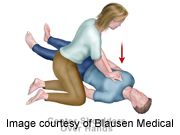
THURSDAY, Aug. 30 (HealthDay News) — People who suffer a cardiac arrest during or shortly after exercise are three times more likely to survive than those who have a cardiac arrest not linked to exercise, a new study finds.
Sudden cardiac arrest results from an abnormal heart rhythm that causes the heart to stop beating.
Researchers in the Netherlands looked at more than 2,500 out-of-hospital cardiac arrests in the greater Amsterdam area between 2006 and 2009. Of those, 145 occurred in people who were exercising or had exercised within the previous hour, including 49 who were bicycling, 22 who were playing tennis, 16 who were doing a gym workout, and 13 who were swimming.
The survival rate for patients in the exercise group was 45 percent, compared with 15 percent in the non-exercise group. None of the survivors in the exercise group suffered serious brain damage, which did occur in some of the survivors in the non-exercise group.
The patients in the exercise group were younger (average age 59 versus 66) and more likely to be male than those in the non-exercise group. The exercise-related heart attacks occurred more frequently in public places (99 percent versus 25 percent), were more frequently witnessed (89 percent versus 76 percent), and had higher rates of bystander CPR (86 percent versus 64 percent) and automated external defibrillator use (35 percent versus 22 percent).
The study was presented Sunday at the European Society of Cardiology Congress in Munich. The data and conclusions of research presented at medical meetings should be viewed as preliminary until published in a peer-reviewed journal.
“The remarkably good survival of victims of exercise-related out-of-hospital cardiac arrest can partially be ascribed to the fact that they are younger and more likely to suffer the arrest in a public location, leading to bystander cardiopulmonary resuscitation, often with the use of an automated external defibrillator. Taking these factors into account, exercise, per se, also contributes to a better outcome,” study author Dr. Arend Mosterd said in a society news release.
“More research is needed to determine why, after taking into account favorable factors such as age, location of the event and initiation of CPR, persons who exercise during or shortly before having a cardiac arrest still have a better prognosis than people who have a cardiac arrest that is unrelated to exercise,” he added.
More information
The U.S. National Heart, Lung, and Blood Institute has more about sudden cardiac arrest.

